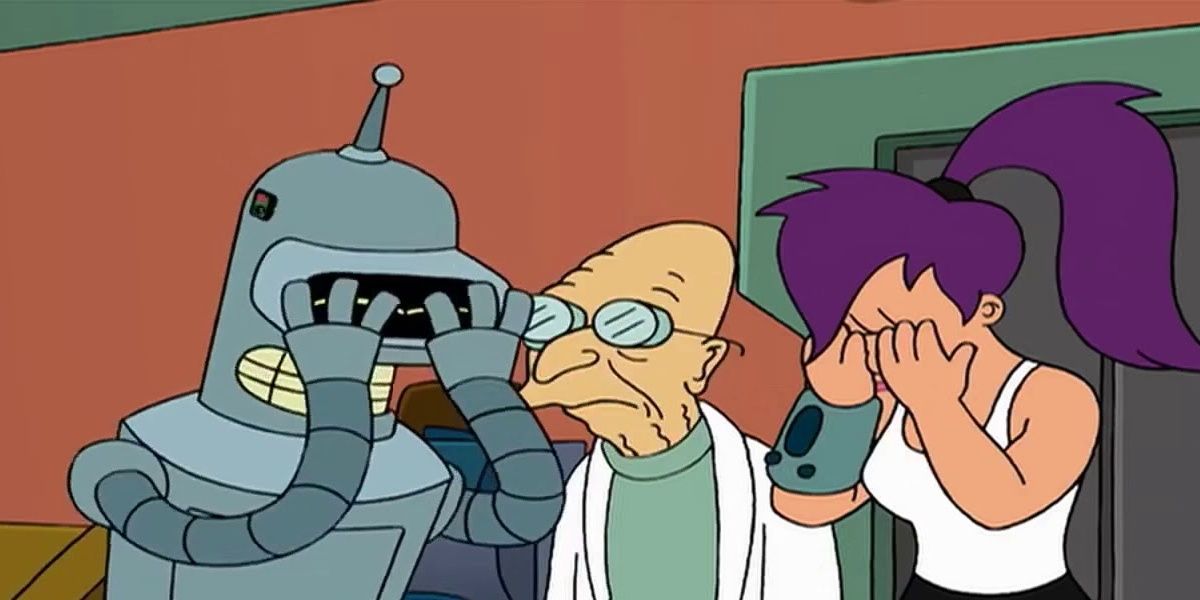This week we watched Brandon Cronenberg’s film Possessor and the Futurama episode “I Second that Emotion”. Both pieces of media express their own ideas of empathy (as well as some of the various theories that are in involved in the topic) as it pertains to this week’s voice thread.
Possessor
First I watched Possessor. I would like to start off my saying that I was not a fan of Possessor. At times I felt the gore and the graphic violence was a bit too much for me. When I saw the possessed Holly Bergman bloodily pierce her skull with an aux cord of sorts to program her emotional frequency and then minutes later proceed to graphically stab a lawyer “Death of Julius Caesar” style, I knew I was in for a long ride. Anyways, Possessor follows woman named Vos who is tasked to “possess” the mind of random people, play a certain role, and carry out various murders with the possessed person dying in the end as well. At around minute 10:25, Girder tells Vos of her next possession, Colin Tate. Vos saying “what’s the narrative?” made me feel as if this scene was an example of the Embodied Cognition. Girder goes on to give Vos character description of how she wants her to possess Colin Tate. As the voice thread says, “When we see the body of another person, we ‘sense’ into their body and ‘live through’ it.” This quote pertains to this scene in that Girder and Vos are essentially creating a story based off his past and body character to try and make him murder his family and leverage a deal between Girder’s company and Colin’s data mining company, Zoothroo.
Futurama
After Possessor, I watched the Futurama episode “I Second that Emotion” which follows Bender and how he reacts to human emotion and empathy.

After flushing Nibbler down the toilet due to his sheer jealousy and frustration towards him, Bender proceeds to make fun of Leela because she is sad that Nibbler is gone. Because of Bender’s lack of empathy for Leela, Professor Farnsworth installs an “empathy chip” on Bender’s head and tunes it to Leela’s emotional frequency. Bender now feels Leela’s emotional pain and can empathize with her. As a result, Bender misses Nibbler and regrets flushing him. I thought this scene compared very well with the beginning scene of Possessor where a possessed Holly Bergman, as I stated before, sticks an aux cord into her skull and programs her emotional frequency to match the emotional frequency of Vos’s. She is seen laughing and smiling — as she turns the knob on the device the cord is connected to, her face turns to a sudden frown followed by a sob. This is juxtaposed to Bender “copying” Leela’s emotions as they both become angry at each other and then cry afterwards. I feel as if these scenes are an example of “Simulation Theory”. As the voice thread states: “Understanding others involves simulating their mental states based on your own experiences.”
laughing and smiling — as she turns the knob on the device the cord is connected to, her face turns to a sudden frown followed by a sob. This is juxtaposed to Bender “copying” Leela’s emotions as they both become angry at each other and then cry afterwards. I feel as if these scenes are an example of “Simulation Theory”. As the voice thread states: “Understanding others involves simulating their mental states based on your own experiences.”

One thought on “Analysis Post #2 — Empathy”
Hi Paul,
I am sorry that you did not enjoy the film, but I was interested in the scenes you sited as signaling to you that you would not enjoy it and how we can think about them in terms of embodied cognition. When Holly inserts the cord into her head, I also squirmed (but as a fan of horror, I don’t mind films that make me squirm—in fact, I seek it out). Why do you think we have that kind of embodied response to scenes like that. What role might our ability to sense into a feel the experience of others play?
In your post, you suggest that Vos’s interaction with the objects during her deprogramming is a form of embodied cognition. Can you say a bit more about how you see those scenes as demonstrating our ability to “sense into” and “live through” the body of another?
The connection that you make between Holly and Bender is also really interesting. But I don’t think it is an example of simulation theory. Simulation theory argues that when you empathize with someone, you essentially run a simulation of what you would do in their circumstances. That’s not quite what we are seeing here. Instead, Holly and Bender are both directly experiencing the emotions of another.
Jessica Hautsch